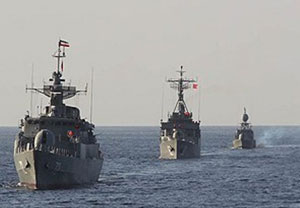Commander Raises Possibility of Iran’s Naval Deployment in Mediterranean

 Lieutenant Commander of the Iranian Navy Rear Admiral Gholam Reza Khadem Biqam underlined the possibility of the dispatch of Iranian warships to the Mediterranean and the Southern hemisphere.
Lieutenant Commander of the Iranian Navy Rear Admiral Gholam Reza Khadem Biqam underlined the possibility of the dispatch of Iranian warships to the Mediterranean and the Southern hemisphere.
“We emphasize that our forces will be sent to different international straits, waterways, oceans and seas,” Khadem Biqam said addressing a forum in the Northern city of Noshahr on Wednesday.
Asked about the possibility of the Iranian Navy’s presence in the Mediterranean given the regional developments, he said, “We will likely go to the Mediterranean, the far coasts in the Southern hemisphere and off the African coasts, depending on the decisions to be made by the General Staff of the Armed Forces.”
His remarks came after the Iranian Navy dispatched its 27th flotilla of warships to the high seas in August to protect the country’s cargo ships and oil tankers against pirates.
Iran’s Navy Commander Rear Admiral Habibollah Sayyari said the 27th Fleet is comprised of the Khark helicopter carrier and Sabalan destroyer.
The 27th fleet was dispatched after the return of the 26th fleet of the Iranian Navy, comprised of the Bandar Abbas warship and the Alvand destroyer, the Iranian commander added.
Sayyari also said that the mission of the warships is to provide security for Iranian oil tankers and commercial ships sailing on the open seas.
He added that the 26th Fleet had operated in the Gulf of Aden, the Red Sea, and the Northern Indian Ocean during its mission on the open seas and visited a number of ports in Oman and Djibouti.
The possibility of the Iranian warships’ deployment in the Mediterranean was raised after Russia’s President Vladimir Putin said in June that Moscow had deployed 16 warships and three ship-based helicopters to the Mediterranean Sea
Russian ships have been making regular visits to the Mediterranean, but the recent move marks the country’s first permanent naval deployment in the region since Soviet times.
Putin said the plan is not meant as a threat to any country and should not be seen as “saber-rattling”.
The Russian president added that the Mediterranean Sea is “a strategically important region and we have tasks to carry out there to provide for the national security of the Russian Federation”.
The announcement comes after Moscow said it intended to resume patrols by nuclear-armed submarines in the Southern seas, which is part of a broader effort by Putin to revitalize Russia’s military power.







